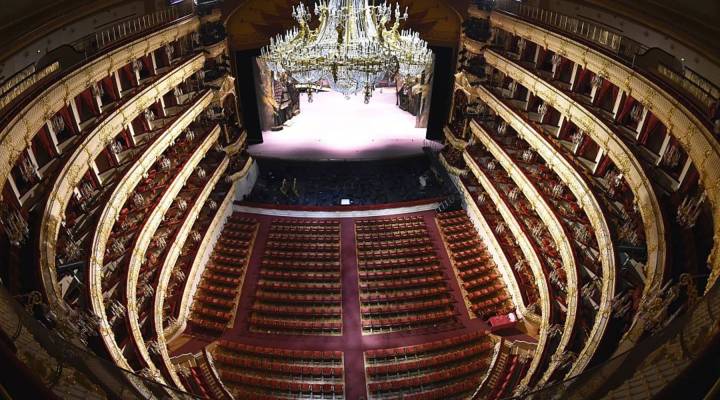
The Bolshoi Theater: Promoting Russia’s brand

The Bolshoi Theatre in Moscow, Russia is known to be the pride of the nation. After the theater was built in the Mid 19th century, it quickly became a cultural institution and a global brand for the Russian nation. The Bolshoi is associated with the beginnings of ballet, as it premiered Tchaikovsky’s Swan Lake in 1877. This institution withstood the rise and fall of the Soviet Union, but not without struggle. Host Kai Ryssdal talked with author Simon Morrison about his new book, “Bolshoi Confidential: Secrets of the Russian Ballet” and about the theater’s colorful history.
On the theater’s rebirth after the fall of the Soviet Union:
It suffered greatly. The theater is largely funded by the government. When oil revenues collapsed, the budget of the theater collapsed with it, went down with it. So, it was in a terrible state, disrepair- I remember seeing performances after the end of the Communist period in the 90s, in which suddenly the singing was out of tune in the operas. But then, with the revival of the economy, the budget increased and the theater under Medvedev underwent this very ambitious renovation. You know, it rose to a glory that it hasn’t seen since, really, the middle of the 19th century.
On the fate of the state of the Bolshoi Theater under President Putin:
It’s an interesting question. Mr. Putin doesn’t seem to have a great deal of interest in the fine arts. He’s a sports person and- somebody has quipped in one of the reviews of the book I read that, you know “just let him wrestle bears! It’s good for the ballet.” But I would say that he has not exerted much control over the theater himself. But still the theater, because it is the State Academic Bolshoi Theater, and because it is the symbol of the nation, and is a diplomatic tool, what it performs and its repertoire is still, to some degree monitored. They have to be careful about putting on works that might be implicitly critical of, say, the Russian Orthodox Church or the government. And so patriotic fare is all important.
Read and excerpt of Morrison’s Bolshoi Confidential: Secrets of the Russian Ballet from the Rule of the Tsars to Today” here.
There’s a lot happening in the world. Through it all, Marketplace is here for you.
You rely on Marketplace to break down the world’s events and tell you how it affects you in a fact-based, approachable way. We rely on your financial support to keep making that possible.
Your donation today powers the independent journalism that you rely on. For just $5/month, you can help sustain Marketplace so we can keep reporting on the things that matter to you.


















